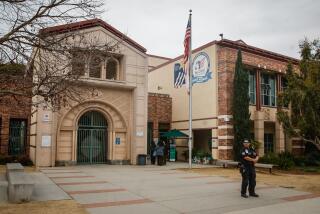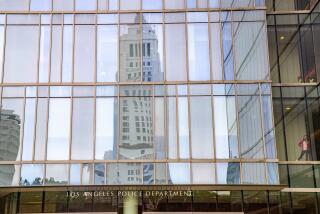U.S. Grand Jury Refuses to Indict Photographer : Law: In a rare move, the panel rejects prosecutor’s request that it charge man with child pornography. His defenders maintain that his pictures have artistic merit.
- Share via
SAN FRANCISCO — In a rare rebuke to prosecutors, a federal grand jury here has refused to indict Jock Sturges, a prominent fine-arts photographer who was the subject of a 17-month investigation concerning child pornography.
The inquiry had drawn widespread protests from artists, politicians and civil liberties attorneys as an improper intrusion on the right to free expression. The San Francisco Board of Supervisors adopted a resolution last year urging authorities to drop the probe.
U.S. Atty. William T. McGivern Jr., citing the secret nature of grand jury proceedings, said he could not comment on the reasons for the action. But he defended the government’s investigation as “thorough, reasonable and complete.”
Grand jury proceedings are closed to the public and largely controlled by prosecutors, who present evidence to its members without any defense witnesses or rebuttal. Although grand juries can refuse to bring indictments sought by prosecutors, such actions are unusual.
“I don’t think you would find a grand jury outside of San Francisco with the guts not to do what the prosecutor wanted,” Sturges’ attorney, Michael H. Metzger of Sausalito, said Monday. “I congratulate them for their show of independence.”
Sturges, who has been traveling abroad, was contacted Monday and told of the grand jury’s refusal to indict. “He’s elated,” Metzger said. “This has been devastating for Jock. He is indeed one of the nicest and gentlest people I know. He never had any kind of sexual exploitation of children on his mind.”
The publicly shown works of the 44-year-old photographer often depict nude women and children and have been presented widely at galleries and museums, including the Metropolitan Museum of Art and the Museum of Modern Art in New York. Museum curators, gallery owners and others have praised his work as serious art and not pornographic.
The case arose last year after a San Francisco photo processing laboratory called the FBI to report it had received negatives showing nude young girls in suggestive poses.
Armed with a search warrant, federal and local agents entered Sturges’ studio and confiscated thousands of negatives and photo equipment. The material was eventually returned, some by court order.
Protests arose, but the FBI strongly defended its investigation, saying that the particular photographs they were examining in the case were not the ones exhibited in public by Sturges. The photographer denied that his work was pornography, saying he was only taking nude pictures of “naturist” friends and their children after gaining permission to do so.
At issue during the probe was whether Sturges should be charged with violating federal laws prohibiting the distribution of photos of minors that depict “the lascivious exhibition of the genitals or pubic area.”
The courts have held that the pornographic depictions of children are not protected by the 1st Amendment, even if they do not meet the legal definition of obscenity. Unlike obscenity laws, which are aimed at protecting community standards or sensibilities, child pornography laws seek to protect children from abuse or exploitation.
While reasons for the grand jury refusal were not disclosed, attorneys noted that a 1990 ruling by a federal appeals court here listed a number of factors that are considered in deciding whether there has been a “lascivious exhibition” of child nudity.
Among other things, a criminal charge can be sustained when the focal point of the photo is the genitals, the setting of the photo is sexually suggestive, the child is shown in an unnatural pose or the photo is designed to elicit a sexual response.
The government’s announcement of the end of the grand jury investigation terminates the criminal investigation, McGivern said. Metzger said that other attorneys are considering filing civil rights suits seeking damages on behalf of Sturges against law enforcement officials involved in the probe.
More to Read
Sign up for Essential California
The most important California stories and recommendations in your inbox every morning.
You may occasionally receive promotional content from the Los Angeles Times.













